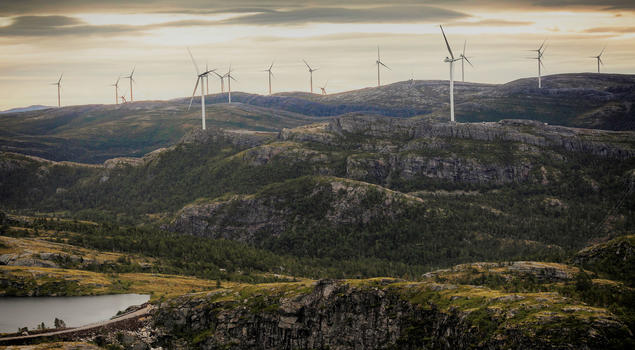Social justice in the energy transition: FNI part of new Research Centre

How do we achieve a socially inclusive and fair transitioning towards a low-carbon society? Can climate and renewable energy goals be achieved without alienating key stakeholders and affected parties?
These are among the questions to be addressed in a new research centre in which FNI will be one of the key contributing partners.
The centre, named INCLUDE (from ‘INCLUsive Decarbonization and Energy transition’), was presented at a conference in Oslo 21 May, and is one of two new FMEs (Research Centres for Environmentally friendly Energy) established by the Research Council of Norway. FMEs involve a broad range of private and public sector user-partners and are set up to be national ‘frontrunners’ in their field. ‘They are exclusive’, Tone Ibenholt of the Research Council underlined in her presentation, in that they involve funding for a period up to eight years - a midway evaluation decides whether the centre will continue after the first five years.
Social fairness
 The goal of INCLUDE is to develop knowledge-based solutions that can facilitate a just and socially inclusive low-carbon energy transition. Participatory processes involving municipalities, citizens and energy corporations – 23 different user-partners in total - will be a key part of the centre’s work.
The goal of INCLUDE is to develop knowledge-based solutions that can facilitate a just and socially inclusive low-carbon energy transition. Participatory processes involving municipalities, citizens and energy corporations – 23 different user-partners in total - will be a key part of the centre’s work.
The centre will be led by Professor Tanja Winther of the University of Oslo (UiO), with six main research partners: The Fridtjof Nansen Institute (FNI), the Arctic University of Norway (UiT), CICERO Center for International Climate Research, The Institute of Transport Economics (TØI), OsloMet and Durham University, UK.
This is a really timely project, and an important area for social science research’, said FNI Senior Research Fellow Tor Håkon Jackson Inderberg. He will be leading INCLUDE’s research on energy systems, with a focus on the restructuring of land-based energy systems, energy sources and carriers, and on the integration of EU policies in the Norwegian energy sector.
Preparing for change
FNI Director Geir Hønneland was honoured when the announcement became public 21 May. 'FNI has established itself as a significant contributor in social science energy research, not least in the field of EU energy and climate policies. With the establishment of this Centre, we continue to have high ambitions and a dedicated focus on these issues’, said Hønneland.
Also Freiberg, the Minister of Petroleum and energy, underlined the importance of social science to understand and grapple the significant changes that are under way in the energy sector:
Technologies are changing rapidly and, in the years ahead, we will be seeing major changes towards a low-carbon society. We need social science research to be prepared for this process. The two new FME centres will play an important role here, said the minister in a statement.
The other new FME Centre, Norwegian Centre for Energy Transition strategies (NTRANS) will be led by NTNU. They replace three other social science FME centres which were established in 2011, and which are coming to an end this year. CICEP, where FNI also has been a partner, is one of them.
INCLUDE will be up and running in January 2020. You can follow FNI and the Centre web page (forthcoming) for updates.
